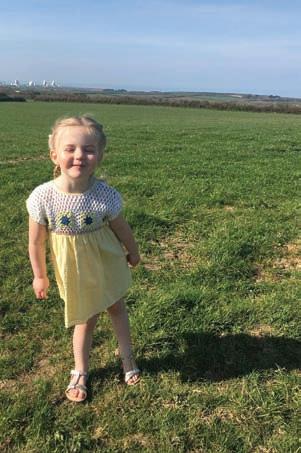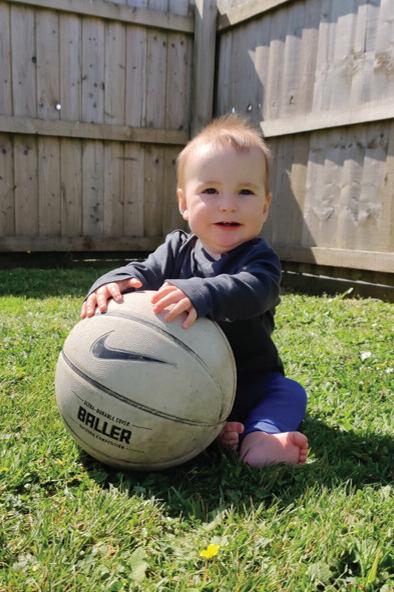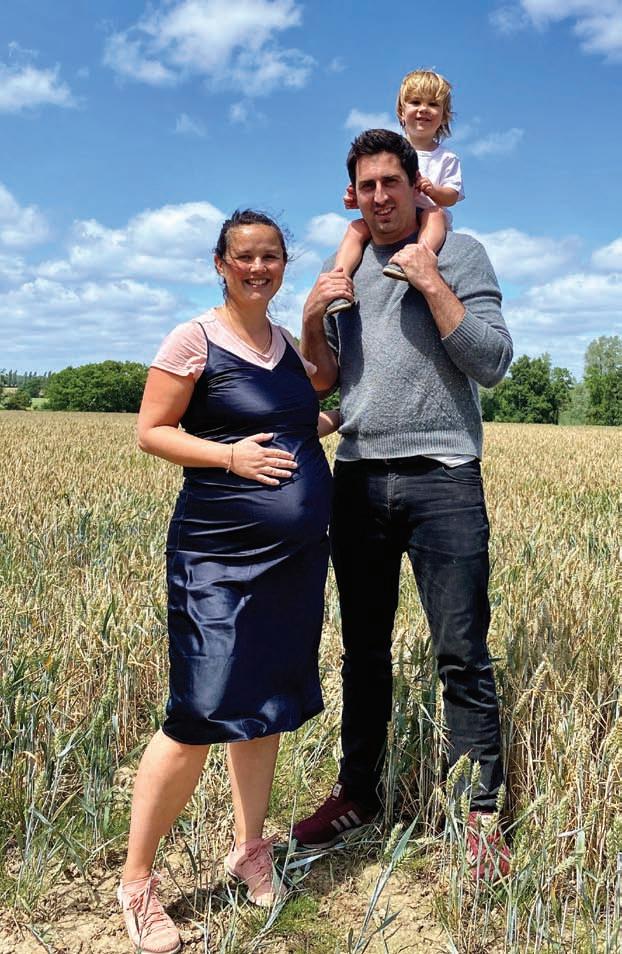
14 minute read
TV producer Andy Clarke shares some summer cocktail ideas
Oscar Edwards has just celebrated his first birthday with a lockdown party and a rainbow cake. It wasn’t what his mother Clare had originally planned but, for Oscar, simply reaching the milestone birthday is reason to celebrate. At three days old, Oscar was flown from the Royal Cornwall Hospital to Bristol Children’s Hospital to receive emergency treatment for a rare heart condition. Within hours of being born, Oscar’s oxygen saturation levels had plummeted. Doctors had begun to suspect that he might have something wrong with his heart and had set up a video link with the specialist paediatric cardiac team in Bristol to get a second opinion. “Apparently it was the first time in three years that a baby had been born in Cornwall with the condition and the doctors in Bristol said they wanted Oscar there within 48 hours. It was awful,” Clare says.
While Oscar was kept stable, hospital staff in Cornwall tried to make arrangements for him to be transported to Bristol. Twice a land ambulance was arranged but, on both occasions, it was cancelled. “We completely understood that something more serious had come up, but it was very frustrating, and we were getting to the point of despair,” explains Clare. It was at this point that a call was made to the Children’s Air Ambulance, a national charity which provides lifesaving helicopter transport for babies and children and works closely with clinical transfer teams in lead hospitals, such as Bristol. Within a matter of hours, the Children’s Air Ambulance helicopter had collected a specialist team of doctors from Bristol, flown down to Cornwall and brought Oscar back.
Advertisement
“When we were told the Children’s Air Ambulance was coming, we were shocked and so pleased that he was going to be taken to where he needed to be. We looked out of the hospital window and saw the helicopter like a big green angel in the sky,” Clare recollects.
Oscar is just one of 75 children in the South West for whom the life-saving difference has been made over the last few years by the partnership between the Children’s Air Ambulance and the transport team at the Bristol Children’s Hospital. Set up originally in 1997 to coordinate the transfer of critically ill children within the South West region, the team re-branded as WATCh (Wales and West Acute Transport for Children) in 2015 when it took on additional responsibility for children in Wales. Staffed 24/7 from an ambulance station near Temple Meads, WATCh now receives around 1,500 calls each year from regional hospitals spanning from Cornwall up to Gloucestershire and Wiltshire and across the border into Wales. Half of these calls involve children who need to be moved to a specialist hub – usually Bristol or Cardiff – for more complex treatment.
Bristol Children’s Hospital is one of just a handful of hospitals nationwide with a highly specialised paediatric intensive care. It has a number of major specialities such as its neurosurgical and epilepsy surgery programmes and is the only designated hospital outside of London in the entire south of England and Wales for children with burns. Given this level of expertise and the sheer size of the South West region, it is no surprise the WATCh team is one of the most frequent users of the rapid helicopter transport provided by the CAA.
“We receive calls from physicians in local hospitals about children who have presented as seriously unwell, and the physicians are either looking for advice about management or transport to Bristol or Cardiff,” says Will Marriage, paediatric intensivist and WATCh lead. “While a small proportion of the calls are trauma-related, most tend to be medical patients with illnesses ranging from meningitis and heart disease to kidney failure and neurological issues.”
The WATCh team acts as a referral hub, with a paediatric intensive care consultant taking the initial call and patching in specialists directly from Bristol Children’s Hospital. The complex decision on ➲
whether and how to transfer the child often depends on a range of factors, including an assessment of how unwell the child is, the ability of the local hospital to provide the care needed and how quickly they need to be moved. In some cases, it is no exaggeration to say that speed saves lives, and it’s here that the Children’s Air Ambulance makes that crucial difference. From the time a call comes into WATCh, it can take them just an hour to coordinate with the Children’s Air Ambulance and arrange a rendezvous for the clinical team with the helicopter on the rooftop helipad of the Bristol Royal Infirmary. The helicopter then flies the team down to the local hospital and returns with the patient, with journeys that would have taken hours by road taking minutes by air.
“Being able to transfer children by air makes two huge differences,” says Will. “The reason people are moving these children at all is because the local hospitals are not all set up to care for these children who are critically ill. That expertise lives in Bristol with us, so the first advantage is you can deliver a critical care team of experienced doctors and nurses to the patient much more quickly. We can be at their bedside making a difference sooner. Secondly, for the patient themselves, the journey time is important. For some children who are particularly unstable, the fact that you can get them to where they need to be as quickly as you can makes a difference.”
According to Donna Young, head of fundraising at Children’s Air Ambulance, flight times are commonly more than four times quicker than transfer by road. “Time saved can mean a life saved and this is where the service really does make a difference in the South West,” she explained. “The aircraft is able to bypass road networks and reach more remote locations.”
Damian Inch knows better than anyone what a quick response can mean to the family of a desperately ill and rapidly deteriorating child. As a newborn, his daughter Elsie was transferred by air ambulance from North Devon District Hospital to Bristol Children’s Hospital for emergency heart surgery. It is a flight which Damian believes saved Elsie’s life. “She would’ve died – no two ways about it. The speed and the extra time that was saved, had a massive impact,” he said.
Born with an undiagnosed congenital heart disorder, Elsie’s condition was only noticed by chance by a midwife and after taking a sudden turn for the worse, her only option was a transfer to Bristol for emergency specialist surgery. Her critical condition, however, made transport by road a real challenge. The decision was taken to call in WATCh and the Children’s Air Ambulance. “They were hopefully going to transfer her straight back up if she was stabilised, but when they started to put a feeding tube in, she was gasping for air and it took them four hours to stabilise her enough to fly,” says Damian. “It was getting close to being dark but the pilot was keen to take off and she probably wouldn’t have made it if we hadn’t.’’ The 100-mile journey took just 24 minutes by air, delivering Elsie safely into the hands of the surgeons in Bristol. Now three years old, she takes centre stage at nursery with her singing and dancing.
As the needs of the medical teams and patients evolve, so too does the service provided by the Children’s Air Ambulance. Already the only intensive care aircrafts in the country dedicated to paediatric transport since 2012, the charity has just added two new pieces of life-saving equipment into their two bespoke state-of-the-art helicopters. Alongside ventilators, monitors, infusion pumps and a baby pod, they are now the first air ambulance service in the UK to provide ECMO (extra corporeal membrane oxygenation) and nitric oxide functionality on-board. ECMO, a system similar to a heart and lung bypass machine, is a temporary means of providing oxygen to the body when normal methods of intensive care are failing, while nitric oxide is an inhaled gas used with a ventilator to treat respiratory failure in premature babies and infants. The new equipment enables the doctors to provide pioneering in-flight care for the sickest of children, for whom a transfer by road may not even have been an option. “Children’s Air Ambulance have been very helpful and proactive in developing their service in response to what the teams have said they wanted,” says Will Marriage. “They fly all the equivalent teams in other major cities across the country, and the reason all the teams work with them is that they’ve been very good at listening to what we say we need. It’s been a very good relationship.”
Donna Young works closely with WATCh through annual training days where the teams are able to immerse themselves in the flight environment and carry out clinical simulation training. “There are also monthly governance calls which provide a forum to debrief mission activity, training needs and any lessons learnt,” she says. “All this is done to ensure the best outcome for the young patients we fly.”
With no standard government funding and hit hard by the impact of covid-19, the charity relies on public donations to keep flying its vital missions – a mission can cost £3,500 on average – and has plans to develop its fundraising capabilities in the South West. “Our plan is to build on the network of community fundraisers we have to cover the UK, and the South West region will be a priority for us in this growth,” Donna adds. “It would be fantastic to grow our web of fundraising volunteers into the South West and support more local people with their fundraising. We are exploring challenge events in the area and would encourage budding fundraisers to get in touch with our team so we can help them to raise money for us.” ■ • childrensairambulance.org.uk
Elsie’s 100-mile heli journey took 24 minutes, delivering her safely into the hands of Bristol surgeons



Oscar’s mum saw the helicopter as his big green angel in the sky
IVF and me
As the date nears for the birth of her second IVF baby after treatment at the Bristol Centre for Reproductive Medicine, Karen Markssays despite the anxieties of the lockdown she’s enjoying every step of the journey

September can’t come around soon enough for Karen and James Marks when they’ll be meeting their new longed-for second baby for the first time.
The couple who married in 2014 feared they might never have a child of their own after Karen failed to get pregnant and was later diagnosed with fertility issues.
Now six years on, Karen is set to bring a younger brother or sister for 22-month-old Cameron into the world and the pair are counting the days until the happy event.
Both pregnancies were achieved through IVF at the Bristol Centre for Reproductive Medicine (BCRM), which treats both private and NHS patients.
Karen and James initially attended one of the clinic’s regular informal introductory evenings hosted by Dr Valentine Akande, BCRM’s medical director and lead clinician, which include a short consultation.
“Valentine, his colleagues and the facilities impressed us so much we decided to proceed,” said Karen, 32.
“They have been such a wonderful and supportive bunch to deal with, in particular director of nursing and clinical services, Carrie Lomax, who we think is one of the most amazing nurses in the world.
“The BCRM team becomes as much a part of your fertility journey as you want them to be. They really care. For us they became like extended family.
“I needed that sort of relationship, but if that’s not what a patient wants, they don’t press – you feel very much in control.”
The Marks’s were given funding for one round of IVF on the NHS in September 2017.
During minimally invasive egg retrieval procedure surgeons collected 15 of Karen’s eggs which were fertilised with James’s sperm in BCRM’s labs in September 2017.
Five viable embryos were created, from which one was transferred back into Karen’s uterus. “People say IVF can affect your hormones when you’re on the meds, but I remember this as a calm time. I was unconscious for the egg collection, but that was it. And no pain at all.” Happily, for Karen and James, 35, the procedure worked first time and after a seven-week viability scan, she was discharged into the care of her local community midwife team in Taunton. The pregnancy proceeded normally,
Nurse Carrie Lomax, ‘’one of the with the birth of a most amazing nurses in the world’ full-term baby boy,

Cameron McLennan James Marks weighing in at 6lb 10oz on September 1, 2018.
Eighteen months on, Karen and James are now expecting their second baby under the care of BCRM fertility consultant Dr Alex Price, due to be born in September 9.
“In many ways it’s been so much easier the second time around,” added Karen. “Alex is just lovely. She made me feel at home as soon as we returned.
“Even after I’ve given birth to our second child, we’ll still have two frozen embryos left if we decide we’d like a bigger family.”
Karen was 16 weeks into the pregnancy when the lockdown began in March and admits although it is not the easiest time to be having a baby, the family are in good spirits.
“The main thing is we are going to have a wonderful new brother or sister for Cameron and hopefully Covid-19 will be something for the history books to tell our grandchildren about!”
The Bristol Centre for Reproductive Medicine has world class facilities and technology that treats both private and NHS patients. BCRM is involved in innovative research and has one of the best success rates with IVF and other fertility treatments in the UK.
To register for a virtual open evening webinar or to book an initial consultation appointment email BCRM at: info@BCRM.org.uk call 0117 3018605 or visit: www.fertilitybristol.com.

CNM Pioneers Online Natural Health Diploma Courses

Responding to the current worldwide health challenges, the College of Naturopathic Medicine is now offering online its internationally recognised diploma and short courses to overwhelming positive response from the public.
CNM graduates and students know: - that a healthy and robust body can resist infections better and return to health faster - that a strong immune system is important - how to boost the immune system naturally

At CNM we believe that good health comes from education and practice. The CNM Diploma courses, based on time-proven natural medicine principles and cutting-edge scientific evidence, include, in addition to the informative lectures, many clinical practice sessions. Students apply their knowledge in real-world clinic scenarios throughout their studies. Combined with thorough business marketing training, this offers CNM graduates all of the skills, knowledge and tools required to start a thriving business upon graduation.
More about CNM (College of Naturopathic Medicine):
CNM is a pioneer in delivering online courses, as well as having colleges across the UK and internationally. With over 22 years’ excellent track record, CNM trains successful practitioners in natural therapies: surveys show that over 80% of graduates are practising. CNM offers Diploma courses in Nutrition, Herbal Medicine, Acupuncture, Homeopathy, Natural Chef/Vegan Natural Chef and Health Coach. Popular short courses include Vegan Nutrition for Everyday Living and The Gut-Brain Connection.
Find out more: www.naturopathy-uk.com.
Testimonials from students and graduates:
consultations I have honestly learnt far more online than in the classroom. Why? Because I can stop and pause and go back to a certain point to have a better understanding of the subject.
J.S Nutritional Therapy
CNM offered me the flexibility to combine studying with my long working hours. What I loved most about CNM’s course was the variety in the lecturers, their experience and practical advice which really helped set expectations for career development and growth. I found the experience eye-opening, promising and challenging.
R.M Nutritional Therapy
CNM Online Open Events
Discover how natural therapies promote true health and vitality. Our events are packed with inspiring tips on how to nurture yourself in natural, sustainable ways. Geoff Don And if you are thinking of turning your passion into a career, an Online Open Event will also cover what you need to know about studying at CNM. Visit naturopathy-uk.com or call 01342 410 505











